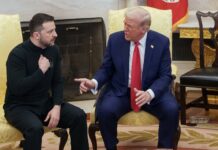Since high school, I’ve been aware that my passion lies in journalism. I dedicated countless hours daily to immersing myself in media material covering government politics, political ideologies, history, as well as societal and cultural conflicts. I knew that pursuing a career in journalism would naturally be the best fit for me.
However, I came to a realization at some point that the vast majority of the content I would consume tended to be from Western countries. Now, there are obvious reasons for this. Like, for example, English being my mother tongue, if English is your mother tongue, or you consume any amount of content in English, American media will almost always dominate your consumption.
American media has been so well established, over centuries at this point, that the majority of the time the best quality and most ubiquitous media originates from the United States of America. As a result, it is often the case that most people, may even, understand the nuances of American politics more than they would have of their own countries. This has certainly been the case with me, I know personally that I have consumed countless hours of American political content. At this point, I probably have a better understanding of the complexities of American politics more than a sizable number of American, yet I have never even set foot on the country.
As much as I find American politics, history, and cultures (and broader Western civilization generally) to be intriguing, I am never going to be an American journalist. My interest has always on Africa, therefore I had decided that in order to better prepare for my career in African journalism, I would make a concerted effort to improve my knowledge of African politics, histories, and so I did.
Now, the unfortunate reality that would immediately smack you in the face, when you make the decision to further educate yourself on African politics and histories, is that the convenience that is often experienced when consuming western media is often lacking. No longer will you conveniently find high quality production documentaries or podcasts, featuring charismatic hosts, presenting on the very topics you are interested in.
Typically, you may find yourself going through a maze of information to learn about a certain topic, only to eventually leave without even having fully grasped all the nuances involved.
Another issue is that much of African tradition media, meaning radio and television stations, I find to be painfully uninspiring. That’s not to say that they are no outliers who buck the trend and produce high quality content, there are, South Africa’s Carte Blanche is a good example of that. However, much of Africa’s traditional media unfortunately suffers from a severe lack of creativity and innovation.
This is a trend that I find to be extremely concerning as a young African and a media practitioner. Africa countries face many major problems, with government corruption often being the root of many of these issues. It is the role of the media, as the fourth estate, to hold those in power accountable for their actions. Most people are not going to spend their time reading through a government bill or spending time listening to debates within parliament, it is the role of the media to effectively communicate these issues towards the public.
However, in many cases, African media (especially traditional media) fail to communicate important stories/ events in an effective manner towards the public, leaving them largely uninformed about much of what the government is working on.
If we, as Africans, aspire to witness genuine and effective change occurring within our countries, I firmly believe that the media will play a crucial role in facilitating that change. That means that more effective means of communication must be adopted in order to increase political participation by the public, especially aimed towards younger Africans.
Changing the African media landscape does not necessarily even mean we would have to reinvent the wheel, it just means we have to be willing to be more creative and flexible in order for the industry to evolve. I know for a fact that there are many Africans who resonate with the sentiments I have expressed in this piece, it’s just about initiating actions to work towards that change.











